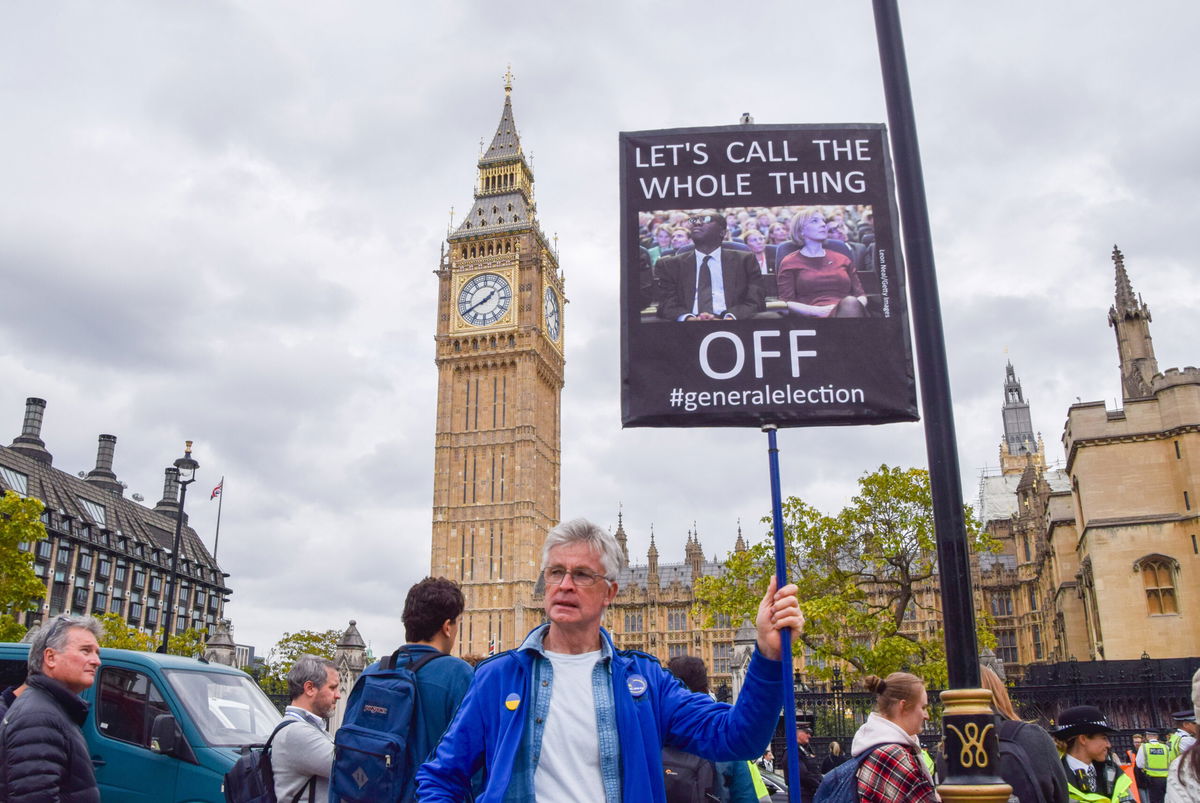Why crisis-wracked UK won’t be having a general election

A protester holds a placard calling for a general election during the demonstration in Parliament Square in London
By Ivana Kottasová, CNN
The United Kingdom is — once again — in the market for a new leader following the resignation of Prime Minister Liz Truss only six weeks into her disastrous premiership.
Truss’ successor will be the fifth PM to lead the country since it voted for Brexit in 2016 — a decision that set into motion the turmoil that ultimately led to the current political chaos.
And while a general election might seem to be the obvious way forward, Brits (and their dogs) are unlikely to be lining up in front of the ballot box any time soon. Here’s why.
Why won’t there be a new election?
In the UK, general elections must be held at least every five years.
Luckily for the Conservative Party, which is currently in power but trailing the opposition in opinion polls, the next vote doesn’t need to be held until January 2025.
That’s because in the UK, prime ministers are not elected directly by the people. In fact, four of the last five British prime ministers came into the role without a general election.
Truss is in Downing Street because she is the leader of the largest party in the House of Commons. She was picked by the roughly 172,000 members of the Conservative Party after the departure of Boris Johnson, who himself became prime minister without a general election after winning the party leadership contest in 2019 — although he did call a new vote in December that year and won.
Theresa May, who served as prime minister before Johnson, also first became PM without an election, as did Labour’s Gordon Brown when he replaced Tony Blair in 2007.
So how will the new PM be picked?
The Conservative Party is still the largest one in Parliament, so its new leader will automatically become prime minister.
While the last leadership election took almost two months — longer than Truss will spend as prime minister — the next one will be swift.
Graham Brady, leader of the 1922 Committee, which represents rank-and-file Conservative members of parliament, said Thursday the new PM will be chosen by next Friday.
To narrow the field of those in the running, the candidates to replace Truss will need at least 100 nominations from Conservative MPs, which means there will be a maximum of three people in the running.
Must the new prime minister call a general election?
No. The next general election is due to take place no later than January 2025.
However, the prospect of Britain seeing its third prime minister since the last poll in 2019 and the second to come into power without a public vote will put pressure on Truss’ successor to ask the public for a new mandate.
The last time three successive prime ministers entered Downing Street without standing in a general election was before and during the World War II.
The opposition, sensing an opportunity, is pushing for a new vote. Keir Starmer, the leader of the Labour Party, which is enjoying a huge lead in opinion polls, repeated his calls on Thursday for an early general election. “After 12 years of Tory failure, the British people deserve so much better than this revolving door of chaos,” he said in a statement posted on Twitter. Scottish First Minister Nicola Sturgeon also called for an early vote, saying a new “general election is now a democratic imperative.”
What do British people think about all this?
Judging by the numerous protests, jokes and memes, many are far from impressed. A public petition calling for a new election was launched in September. It gathered more than 715,000 signatures and was debated in parliament earlier this week.
However, there is little the public can do if the Conservative Party, which is firmly in control of parliament, decides not to call an election now. For many Conservative lawmakers, voting for an early election would mean the end of their political careers. The odds of that happening are likely to be low.
The-CNN-Wire
™ & © 2022 Cable News Network, Inc., a Warner Bros. Discovery Company. All rights reserved.
CNN’s Luke McGee, Rob Picheta and Christian Edwards contributed reporting.
